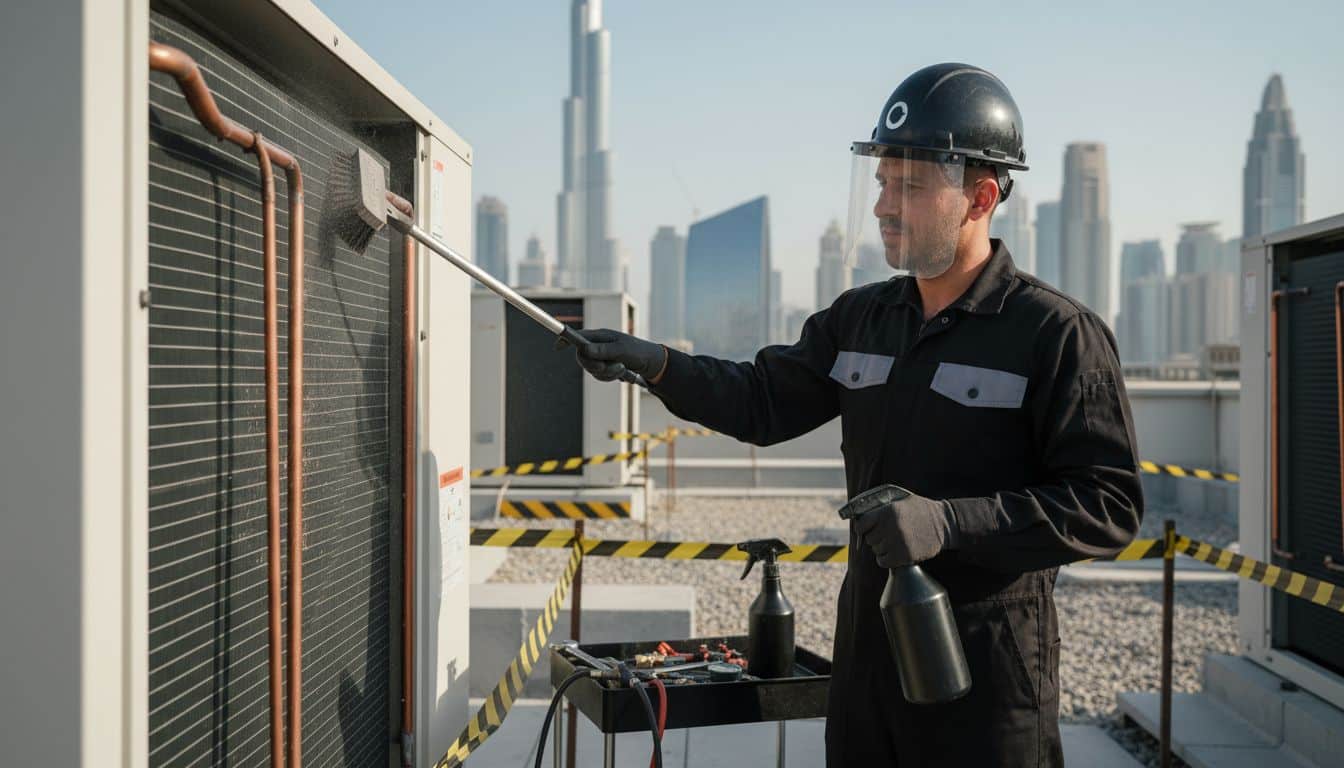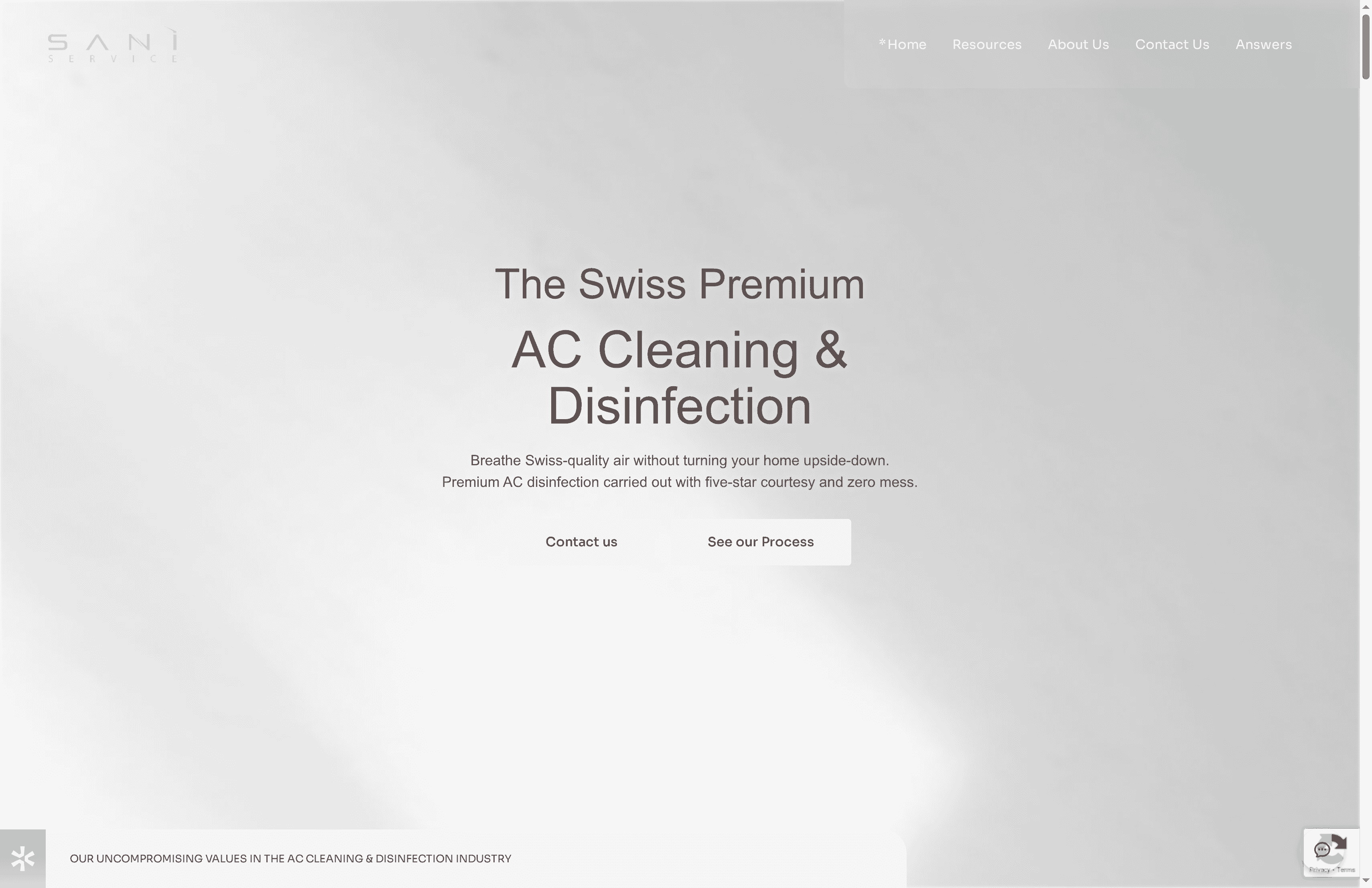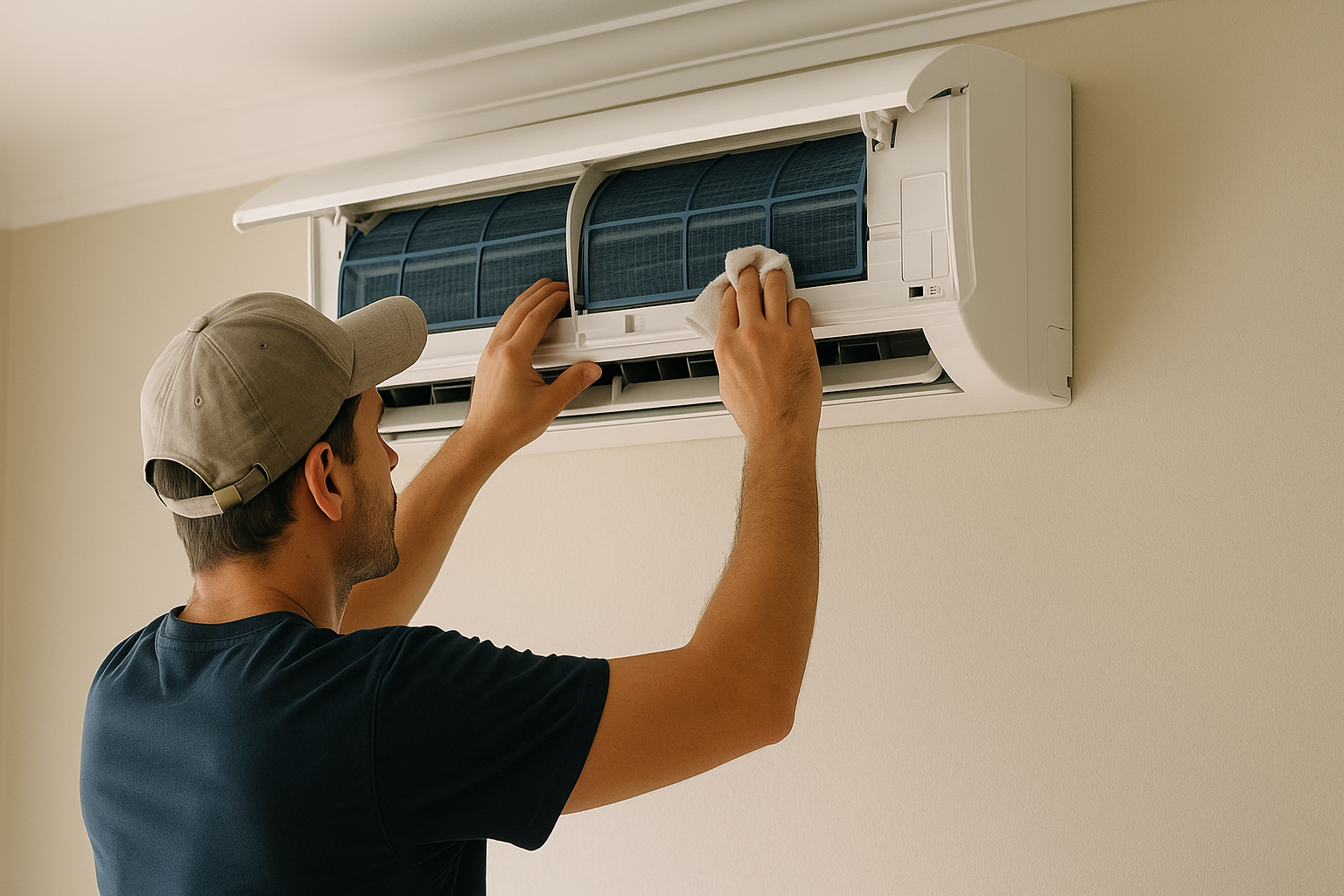
Coil Cleaning Explained: Efficiency, Safety, and Health
More than 40 percent of american homes experience declining air conditioner performance due to dirty coils. Clean, well-maintained coils are the backbone of a reliable AC system, especially in demanding environments like Dubai. Overlooking coil cleaning not only leads to higher electricity bills but can also shorten the life of your equipment. Discover how proper coil maintenance protects your investment, saves on costs, and ensures healthier indoor air quality year-round.
Table of Contents
Contents
- 1 Table of Contents
- 2 Key Takeaways
- 3 What Is Coil Cleaning and Why It Matters
- 4 Types of AC Coils and Cleaning Methods
- 5 How Coil Cleaning Improves Performance
- 6 Health and Safety Standards in Dubai
- 7 Risks, Costs, and Common Mistakes
- 8 Unlock Your AC’s True Potential with Expert Coil Cleaning
- 9 Frequently Asked Questions
- 10 Recommended
- What Is Coil Cleaning and Why It Matters
- Types of AC Coils and Cleaning Methods
- How Coil Cleaning Improves Performance
- Health and Safety Standards in Dubai
- Risks, Costs, and Common Mistakes
Key Takeaways
| Point | Details |
|---|---|
| Importance of Coil Cleaning | Regular coil cleaning maintains optimal heat transfer, improves indoor air quality, and reduces energy consumption. |
| Types of Coils and Methods | Different AC coils require specific cleaning methods, such as dry and wet cleaning techniques, for effective maintenance. |
| Performance Benefits | Clean coils enhance cooling capacity and reduce energy use, which extends the lifespan of HVAC systems. |
| Compliance with Health Standards | Following Dubai’s health and safety regulations is crucial for preventing indoor air quality issues and ensuring system efficiency. |
What Is Coil Cleaning and Why It Matters
Air conditioning systems rely on evaporator coils as critical components for heat transfer and cooling efficiency. These intricate metal surfaces play a pivotal role in maintaining comfortable indoor environments, especially in the demanding climate of Dubai. According to research from uofkej, regular cleaning of these coils is essential to maintain stable temperature distribution, humidity levels, and reduce power consumption.
Coil cleaning involves a meticulous process of removing accumulated dust, debris, microbial growth, and other contaminants from the AC system’s heat exchange surfaces. As findings from iiarcondenser indicate, dirty evaporator coils and fan surfaces can dramatically decrease system efficiency, leading to increased energy usage. The consequences extend beyond mere performance degradation.
The primary objectives of professional coil cleaning include:
- Restoring optimal heat transfer capabilities
- Preventing microbial contamination
- Improving overall indoor air quality
- Reducing energy consumption
- Extending HVAC equipment lifespan
By understanding the critical role of coil cleaning, property owners in Dubai can protect their significant investments in climate control infrastructure. AC Coil Cleaning Step by Step for Healthier Homes provides comprehensive insights into maintaining these essential system components and ensuring long-term performance and health.
Types of AC Coils and Cleaning Methods
Air conditioning systems utilize various types of evaporator coils designed to accommodate different cooling requirements and environmental conditions. These critical components range from bare copper and aluminum coils to advanced microchannel and coated designs, each requiring specialized cleaning approaches. According to ehs, the NADCA Standard identifies two primary coil cleaning methods: Type 1 (Dry Cleaning) for removing loose dust and debris, and Type 2 (Wet Cleaning) for addressing more adhered contaminants.
The most common types of AC coils found in Dubai’s residential and commercial spaces include:
- Copper Coils: Traditional heat exchange surfaces known for excellent thermal conductivity
- Aluminum Coils: Lightweight and corrosion-resistant alternatives
- Microchannel Coils: Advanced designs with multiple small channels for improved heat transfer
- Coated Coils: Special protective surfaces designed to resist corrosion and microbial growth
Professional cleaning methods vary based on coil type and contamination level. As research from iiarcondenser suggests, deep cleaning involving high-volume heated water and specialized cleaners is crucial for restoring system efficiency and preventing contamination risks. 7 Types of AC Cleaning Methods Every Dubai Home Needs provides more detailed insights into the comprehensive approaches used by professional HVAC maintenance teams.
The selection of an appropriate cleaning method depends on several critical factors, including coil material, contamination severity, system age, and potential environmental sensitivities. Professional technicians employ a range of techniques from gentle compressed air treatments to advanced chemical cleaning solutions, ensuring minimal system disruption while maximizing cleaning effectiveness and preserving the integrity of delicate AC components.
How Coil Cleaning Improves Performance
Coil cleaning is a critical maintenance strategy that directly impacts the overall performance and efficiency of air conditioning systems. According to research from datacenters, coil fouling significantly increases system pressure drop and decreases airflow, leading to substantial reductions in air conditioner performance. In the challenging climate of Dubai, where air conditioning systems operate under extreme conditions, maintaining clean coils becomes even more crucial.
The performance benefits of regular coil cleaning are multifaceted:
- Improved Heat Transfer: Clean coils facilitate more efficient heat exchange
- Reduced Energy Consumption: Less strain on the system means lower electricity usage
- Enhanced Cooling Capacity: Unobstructed coils deliver faster and more consistent cooling
- Extended Equipment Lifespan: Minimized wear and tear on critical components
Research from aqualityhvac highlights that dirty coils impede heat transfer, causing the system to run longer and increasing wear on components. This continuous strain not only reduces cooling efficiency but also leads to higher utility bills and potential premature system failure. 5 Smart Insights on AC Coil Cleaning Dubai provides additional context on how local environmental factors uniquely impact AC system performance.
Professional coil cleaning goes beyond simple surface maintenance. Technicians use specialized techniques to remove accumulated debris, microbial growth, and mineral deposits that can compromise system performance. By addressing these issues proactively, property owners can ensure optimal cooling efficiency, reduce energy costs, and maintain a comfortable indoor environment, even in Dubai’s most demanding climate conditions.
Health and Safety Standards in Dubai
Health and safety standards for indoor air quality and HVAC maintenance represent a critical priority in Dubai’s stringent regulatory environment. According to dm, Dubai Municipality’s Health and Safety Department provides comprehensive guidelines and regulations designed to ensure public health and safety, with specific emphasis on preventing potential hazards associated with poorly maintained air conditioning systems.
Key health and safety considerations for AC maintenance in Dubai include:
- Air Quality Monitoring: Regular assessment of indoor environmental conditions
- Microbial Contamination Prevention: Strict protocols for eliminating potential biological risks
- Ventilation System Standards: Comprehensive requirements for system cleanliness and performance
- Chemical Safety: Regulations governing cleaning agent selection and application
Professional HVAC maintenance in Dubai must adhere to multiple layers of regulatory compliance, addressing both immediate health risks and long-term environmental concerns. 10 Critical Health Risks of Poor Indoor Air Quality Dubai highlights the significant health implications of neglecting these critical standards. The regulatory framework emphasizes proactive maintenance, requiring property owners and facility managers to implement systematic cleaning and inspection protocols that protect occupant health and ensure optimal indoor environmental quality.
Beyond basic compliance, Dubai’s health and safety standards reflect a holistic approach to indoor environmental management. Technicians must demonstrate not just technical proficiency, but a comprehensive understanding of how HVAC systems interact with human health. This approach ensures that coil cleaning and maintenance go far beyond simple equipment preservation, representing a critical component of public health infrastructure in one of the world’s most dynamic urban environments.
Risks, Costs, and Common Mistakes
Neglecting air conditioning coil maintenance can lead to substantial financial and operational risks for property owners in Dubai. According to costopedia, professional coil cleaning costs range from $125 to $225 per coil, with comprehensive cleaning of both coils potentially reaching $450. However, the long-term costs of ignoring maintenance can far exceed these preventative investment amounts.
Common mistakes in AC coil maintenance include:
- DIY Cleaning Attempts: Using inappropriate cleaning techniques that can damage delicate coil surfaces
- Irregular Maintenance Schedule: Waiting until significant performance degradation occurs
- Incomplete Cleaning Processes: Superficial cleaning that fails to address deep-seated contamination
- Ignoring Environmental Factors: Not accounting for Dubai’s unique dust and humidity conditions
The potential risks of inadequate coil maintenance extend beyond immediate financial implications. Poorly maintained systems experience significant efficiency losses, increased energy consumption, and accelerated component wear. These issues can lead to premature system failure, unexpected repair costs, and compromised indoor air quality. AC Duct Cleaning Dubai provides additional insights into the comprehensive approach required to mitigate these risks effectively.
Professional maintenance represents a strategic investment in system longevity and performance. By understanding the true cost of neglect—which includes potential system replacement, increased energy bills, and health-related risks—property owners can make informed decisions about regular, professional coil cleaning. The minimal upfront cost of professional maintenance pales in comparison to the potential long-term expenses associated with system inefficiency and unexpected breakdowns.
Unlock Your AC’s True Potential with Expert Coil Cleaning
Dirty coils reduce your air conditioner’s efficiency and can compromise indoor air quality. This article shows how poor maintenance increases energy consumption and health risks while shortening equipment life. You deserve peace of mind knowing your AC system is restoring optimal heat transfer and eliminating microbial contamination with precision and care.
At Saniservice we specialize in professional AC cleaning and disinfection backed by science and executed by NADCA-certified technicians. We meticulously deep-clean coils and all critical components using hospital-grade, chemical-free biosanitisers ensuring safer air and better performance. Explore our proven methods and real results in our AC Cleaning & Maintenance – Saniservice AC Cleaning page.
Take control of your indoor environment now and protect your investment from costly repairs and inefficiency. See how we deliver cleaner, healthier air through our unique expertise by visiting Saniservice. For inspiring client success stories and detailed project insights, visit our Case Studies – Saniservice AC Cleaning section. Don’t wait for problems to arise act today and experience the science-backed advantage in coil cleaning.
Frequently Asked Questions
What is coil cleaning and why is it important?
Coil cleaning is the process of removing dust, debris, and microbial growth from the evaporator coils of an air conditioning system. It’s important because clean coils improve heat transfer, enhance indoor air quality, reduce energy consumption, and extend the lifespan of HVAC equipment.
What types of coils are commonly used in air conditioning systems?
Common types of coils include copper coils, aluminum coils, microchannel coils, and coated coils. Each type requires different cleaning methods depending on the level of contamination and material properties.
How does regular coil cleaning affect energy efficiency?
Regular coil cleaning helps maintain optimal heat transfer capabilities, leading to reduced strain on the system. This results in lower electricity usage, improved cooling capacity, and a decrease in overall energy expenses.
What are some common mistakes to avoid during coil maintenance?
Common mistakes include attempting DIY cleaning with inappropriate techniques, neglecting a regular maintenance schedule, and performing incomplete cleaning that fails to address deeper contamination. Ignoring environmental factors such as dust and humidity can also lead to ineffective maintenance.
Recommended
- AC Coil Cleaning Step by Step for Healthier Homes – Saniservice AC Cleaning
- AC Coil Cleaning Explained: Health, Savings, Longevity – Saniservice AC Cleaning
- Expert AC Coil Cleaning Service in Dubai – Home AC Cleaning
- 10 Critical Health Risks of Dirty AC Coils Dubai Residents Must Know – Saniservice AC Cleaning
- Complete Guide to Auto Detailing for Electric Cars









Leave a Reply